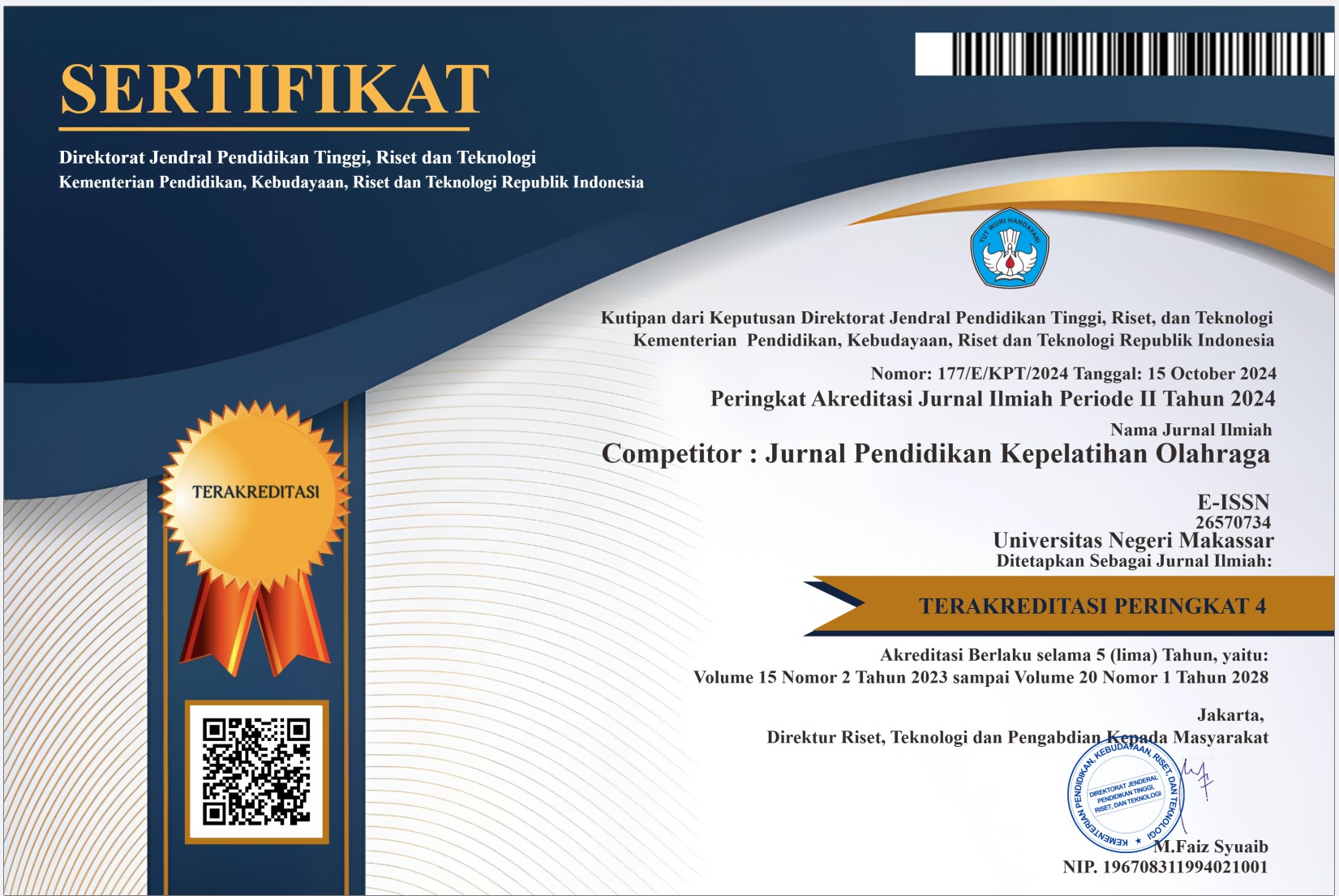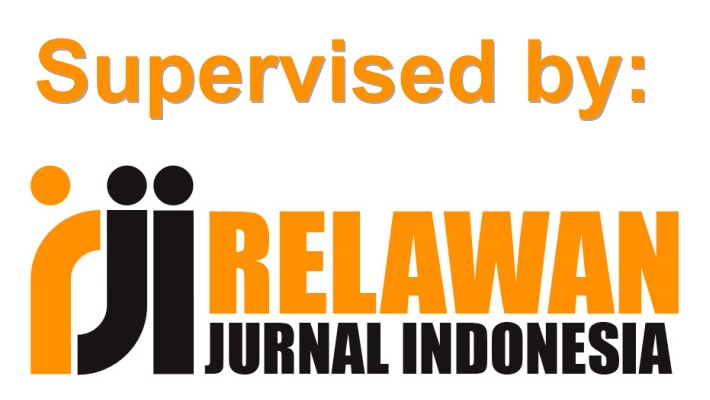The Relationship Between Parenting Styles And Student Discipline Behavior In Physical Education And Health Learning In Upper-Grade Class Elementary School
DOI:
https://doi.org/10.26858/cjpko.v17i1.71989Keywords:
Parenting, Discipline Behavior, PE Learning.Abstract
This study aims to determine the relationship between Parenting and Student Disciplinary Behavior in Learning Physical Education, Sports, and Health (PJOK) in high grades in elementary schools. Using a Quantitative approach with a Correlational method that aims to determine the relationship between two variables. Data were collected through instruments in the form of questionnaire sheets of parental parenting patterns and questionnaire sheets of student discipline in the subject (PJOK) as part of a survey research design filled out by 4th, 5th, and 6th-grade students in elementary schools selected as research samples from elementary schools in Cimanggung District. In this study, the sampling used the Total Sampling technique. The sample of this study amounted to 124 students using the SPSS version.26 software for Windows. Analyzing data using correlation through the stages of normality and linearity test, Kolmogorov-Smirnov, and performing the Pearson correlation test. The results showed that there is a significant and positive relationship between parenting patterns and students' disciplinary behaviour in the context of learning Physical Education, Sports and Health (PJOK) in high school classes. The analysis results produced a correlation coefficient (r) of 0.375 with a very low significance level (p) of 0.002. This significance level (p) of 0.002 is far below the conventional significance threshold set at 0.05. The implication of this study confirms that teachers and parents have a crucial role in creating a supportive learning environment that is responsive to students' disciplinary behaviour. Therefore, effective communication strategies, more adaptive learning approaches, as well as support from schools and parents, are important elements in improving their disciplinary behaviour during physical education learning.References
Afifah, S. N., & Fathoni, A. (2023). Implementation of Parents’ Democratic Parenting Towards the Establishment of Independence of Elementary School Students. Atlantis Press SARL. https://doi.org/10.2991/978-2-38476-086-2_168
Dadı, M. M., & Özer Yıldız. (2023). How Should Physical and Social Communication Be in Physical Education and Sports Lessons? Journal of General Education and Humanities, 3(1), 23–36. https://doi.org/10.58421/gehu.v3i1.172
Faridatun Nurul Mahmudah, Akhwani, Afib Rulyansah, S. (2024). Hubungan Pola Asuh Orang Tua dan Karakter Disiplin Peserta Didik Kelas V SDN X Surabaya. Indonesian Research Journal on Education Web:, 4, 338 – 343. https://doi.org/https://doi.org/10.31004/irje.v4i3.777
Fitriatun, E. (2022). Teknik Pembelajaran Pendidikan Jasmani Adaptif bagi Anak Berkebutuhan Khusus di Sekolah Dasar. Empiricism Journal, 3(2), 277–282. https://doi.org/10.36312/ej.v3i2.1040
Hadjicharalambous, D. D. (2021). Examining the influence of Father’s and mother’s characteristics in positive and negative parenting practices. International Journal of Social Science and Human Research, 04(01), 481–489. https://doi.org/10.47191/ijsshr/v4-i1-04
Hambala, K., Lopez, E. C., Cobrado, D., Naparan, G., Dela Pena, G., & Tantog, A. J. (2023). Exploring the Parents’ Disciplinary Strategies to Promote Children’s Learning Interest. Edukasiana: Jurnal Inovasi Pendidikan, 2(4), 237–250. https://doi.org/10.56916/ejip.v2i4.437
Husdarta, H. J. . (2011). Pengertian Pendidikan Jasmani Menurut. Junal Pendidikan Jasmani, 1991, 9–23.
Jayanti, S. D. (2019). Tingkat Kedisiplinan Dan Sikap Siswa Dalam Pembelajaran Pendidikan Jasmani Olahraga Dan Kesehatan Di Sma Negeri 1 Pundong, Bantul, Yogyakarta. Rabit : Jurnal Teknologi Dan Sistem Informasi Univrab, 1(1), 2019. http://www.ghbook.ir/index.php?name=فرهنگ و رسانه های نوین&option=com_dbook&task=readonline&book_id=13650&page=73&chkhashk=ED9C9491B4&Itemid=218〈=fa&tmpl=component%0Ahttp://www.albayan.ae%0Ahttps://scholar.google.co.id/scholar?hl=en&q=APLIKASI+PENGENA
Marsono, E. (2016). PENGEMBANGAN INSTRUMEN PENGUKURAN DISIPLIN POLA ASUH ORANG TUA PADA PESERTA DIDIK SD KELAS ATAS [UNIVERSITAS NEGERI YOGYAKRTA]. http://eprints.uny.ac.id/id/eprint/83434
Mulya, G. (2018). Peran Pendidikan Jasmani dalam Penguatan Karakter Siswa. Jurnal Sains Keolahragaan Dan Kesehatan, 3(1), 1., 1–5. https://doi.org/https://doi.org/10.5614/jskk.2018.3.1.1
Nabilah Lystia. (2023). Hubungan Pola Komunikasi Orang Tua Terhadap Kedisiplinan Belajar Siswa Kelas V Sdn Rawabuntu 01 Serpong Tangerang Selatan. 67.
Novitalia, Umbu Tagela, Y. W. (2023). PENGARUH POLA ASUH ORANG TUA TERHADAP DISIPLIN BELAJAR SISWA. Jurnal Mahasiswa BK An-Nur : Berbeda, Bermakna, Mulia, 9, 200–209. https://doi.org/http://dx.doi.org/10.31602/jmbkan.v9i1.9524
Pangestuti, R., Agustiani, H., Cahyadi, S., & Kadiyono, A. L. (2018). Indonesian children‘s readiness for elementary school: A preliminary study to the holistic approach to school readiness. Pedagogika, 132(4), 99–114. https://doi.org/10.15823/p.2018.132.6
Rahman, A. A., Angraeni, A., & Fauzi, R. A. (2021). The Activation of Learners’ Metacognition to Promote Learning Autonomy of Good Language Learners. Pegem Egitim ve Ogretim Dergisi, 11(4), 249–253. https://doi.org/10.47750/pegegog.11.04.24
Rahmayanti, S. (2022). Hubungan pola asuh orang tua dengan perilaku sulit makan pada anak usia prasekolah. Literature Review. J. Kesehatan Kartika, 17(1)., 28–37. https://doi.org/doi.org/10.26874/jkkes.v17i1.213
Risal Arywibowo, B. S., Jasmani, P., dan Rekreasi, K., Ilmu Keolahragaan, F., & Priambodo, A. S. (2017). Hubungan Pola Asuh Orang Tua Terhadap Perilaku Disiplin Siswa dalam Pembelajaran Pendidikan Jasmani. … Pendidikan Olahraga Dan Kesehatan, 401–405.
Safari, I. (2016). Perbandingan Hasil Belajar Teknik Dasar Pukulan Pada Permainan Tenis Meja Antara Yang Langsung Mengunakan Net Dengan Tanpa Menggunakan Net Terlebih Dahulu. EduHumaniora | Jurnal Pendidikan Dasar Kampus Cibiru, 1(2). https://doi.org/10.17509/eh.v1i2.2731
Sheillamita, G., Syachroji, A., & Rokhmanah, S. (2023). PENGARUH POLA ASUH ORANG TUA TERHADAP DISIPLIN BELAJAR PESERTA DIDIK SEKOLAH DASAR NEGERI PGSD, Universitas Sultan Ageng Tirtayasa, Indonesia Corresponding Email: [email protected]. 14(2), 66–78. https://unars.ac.id/ojs/index.php/pgsdunars/index
Suherman, A. (2016). The Analysis of Character Education in Teaching Physical Education. Icieve 2015, 232–234. https://doi.org/10.2991/icieve-15.2016.50
Tyaningtyas, K. E., Budiman, M. A., & Damayani, A. T. (2021). Analisis Pola Asuh Orang Tua Terhadap Kedisplinan Belajar Siswa Kelas IV SD Negeri 3 Sidorejo Kendal. Dwijaloka Jurnal Pendidikan Dasar & Menengah, 2(3), 438–451.
Downloads
Published
Issue
Section
License
Copyright (c) 2025 Arsyad Finarkhan Rozaq, Indra Safari, Aam Ali Rahman (Author)

This work is licensed under a Creative Commons Attribution 4.0 International License.



















